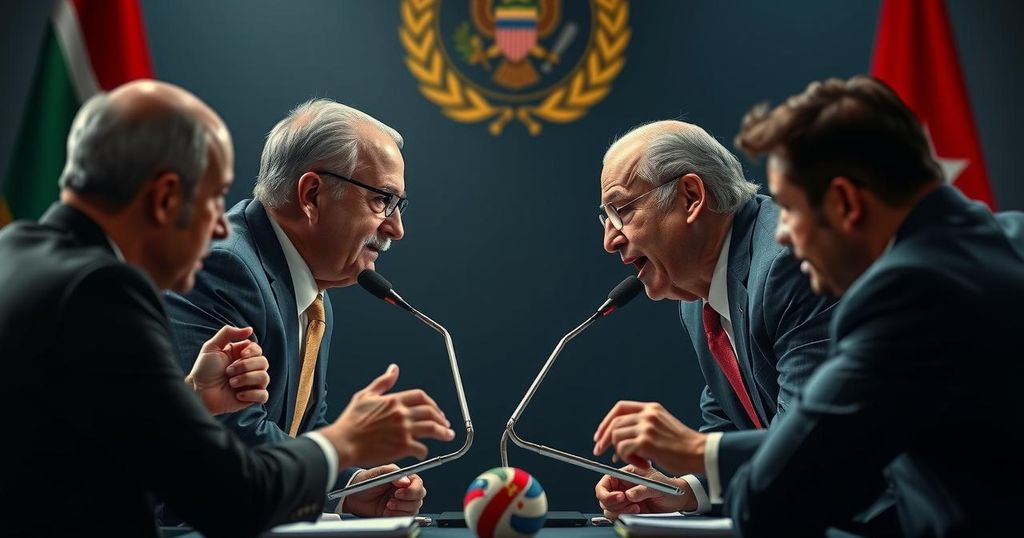The BRICS summit in Kazan saw rising tensions between Brazil and Venezuela after Brazil vetoed Venezuela’s entry as a partner state, further straining their previously fragile relationship. The lack of public explanation from Brazil, coupled with criticisms from Venezuela of interference and hostility, reflects a complex geopolitical dynamic influenced by electoral legitimacy and regional politics. As both nations navigate this impasse, the future of Venezuela’s role within BRICS remains uncertain, particularly with Brazil set to lead the bloc in 2025.
The BRICS summit held in Kazan, Russia, was characterized by increasing diplomatic strife between Brazil and Venezuela following Brazil’s veto of Venezuela’s entry into the bloc as a partner state. This prohibition exacerbated tensions in a relationship that has been fragile since Nicolás Maduro’s reelection as president of Venezuela. The administration of President Lula da Silva refrained from publicly articulating the reasoning behind its veto, with the Brazilian foreign minister, Mauro Vieira, representing the country at the summit in the absence of the president due to an accident. Venezuelan officials branded Brazil’s decision a “stab in the back,” asserting that such interference is indicative of Brazil’s intent to meddle in Venezuelan domestic affairs. Influential diplomats conveyed that Brazil’s assessment was substantially influenced by the integrity of Venezuela’s electoral process, and its implications for regional governance, given the historical ties between Venezuela and Brazil’s Workers’ Party amid allegations of electoral irregularities from the Venezuelan opposition. While Brazil’s Ministry of Foreign Affairs publicly expressed a commitment to the electoral system in Venezuela, they simultaneously initiated negotiations with Colombia to facilitate dialogue with Venezuelan authorities. The Venezuelan government, in turn, emphasized its demand for respect for its sovereignty and an assertion that electoral disputes should be resolved within national borders. Despite the commitments made during discussions, Maduro noted that the Brazilian Foreign Minister had pledged not to obstruct Venezuela’s accession to BRICS. Subsequently, Venezuela’s foreign ministry voiced its dissatisfaction, characterizing the veto as “hostile” and reaffirming their conviction that their representation in this bloc should not be diminished. Maduro’s commentary illuminated a broader sentiment within Venezuela, indicating that the veto reflects a perceived shift in Brazil’s foreign policy compared to previous administrations, particularly in relation to regional solidarity and anti-imperialism principles. Analysts concur that the presentation of Eduardo Paes Saboia, a career diplomat associated with former President Bolsonaro, as a pivotal figure in the veto underlines Venezuela’s discontent without further escalating tensions publicly. The implications of this veto extend beyond mere diplomatic disagreements; they hold significant ramifications for the future of Venezuela’s engagement with BRICS, especially as Brazil assumes the presidency of the bloc in 2025, a position that will enable them to influence guest invitations. As the two nations navigate this impasse, the diplomatic community remains cautiously optimistic about the possibility of Venezuela eventually joining the BRICS as a partner state, though the initial steps have created a challenging backdrop for future negotiations.
The diplomatic relationship between Brazil and Venezuela is historically complex, shaped by political ideologies and leadership changes in both nations. Venezuela, under President Nicolás Maduro, has faced international scrutiny and domestic opposition, particularly concerning the legitimacy of its electoral processes. Brazil, especially under President Lula da Silva, has sought to position itself as a leader in fostering regional integration and stability in Latin America. The recent veto from Brazil regarding Venezuela’s inclusion in BRICS, a significant multilateral group, not only reflects a deterioration of bilateral relations but also influences the wider political landscape within Latin America, underscoring the ongoing struggles for power, recognition, and influence in regional politics.
In conclusion, the veto of Venezuela’s entry into BRICS by Brazil marks a significant moment of diplomatic discord that highlights the fragility of their bilateral relationship. Various geopolitical factors, including Venezuela’s contested electoral legitimacy and Brazil’s evolving foreign policy, contribute to the complexities at play. As Brazil prepares to assume the BRICS presidency in 2025, the stakes surrounding Venezuela’s potential inclusion remain high, necessitating delicate negotiations to ameliorate misunderstandings and foster renewed cooperation moving forward.
Original Source: www.brasildefato.com.br







